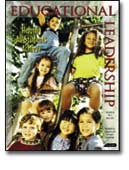How can educators ensure that all students excel? Establishing high expectations, making schools smaller, and developing teaching strategies and programs to respond to the needs of diverse learners are some of the answers. Here are Web sites that can help you explore these approaches.
Reform for High Expectations
In emphasizing higher standards, how do we bridge the many gaps among our students? The Education Trust (www.edtrust.org), whose basic tenet is that "all children will learn at high levels when they are taught to high levels," is a vast resource of reports and other publications, as well as links to other sites that deal with assessments, standards-based reform, and related topics. Check out the Standards in Practice professional development strategy (www.edtrust.org/main/sip.asp), which is designed to "ensure that all activities in classrooms are aligned with standards." You can also download (free) Dispelling the Myth: High Poverty Schools Exceeding Expectations (www.edtrust.org/documents/dispell.pdf), a 1999 report on 366 schools that serve high-poverty students and have received top or most-improved scores on standardized tests.
High achievement for every child is also a goal of the Public Education Network (www.publiceducation.org), a group of community-based school reform organizations. Click "standards initiative" to find projects designed to engage parents, the community, and educators in supporting the implementation of standards and high expectations for all students. From there, you can read about several projects; click "educators," for example, to find out how 28 elementary school principals in Baltimore began structured "walkthroughs" as a way to develop effective instructional leadership.
The Comprehensive Centers Network (www.ccnetwork.org) provides valuable information about implementing school reforms. Created by the U.S. Department of Education, 15 regional comprehensive centers help school districts and state education agencies implement reforms under the 1994 Improving America's Schools Act (IASA). Click "publications" for links to newsletters about schoolwide reforms throughout the United States.
Smaller Schools and Classes
Do more students achieve at higher levels if they are in smaller schools? The Small Schools Project (www.smallschoolsproject.org) at the Center for Reinventing Public Education, University of Washington, has resources on such topics as how small schools increase student achievement and participation in school activities.
Reducing the size of a class is another reform that has gained much interest and funding recently. You can find information about class size reduction at Wisconsin's SAGE Web site (www.dpi.state.wi.us/dpi.oea.sage/index.html) and at the site for Tennessee's STAR program (www.telelink.net/~heros/factsheet.htm). At the U.S. Department of Education's class size reduction initiative site (www.ed.gov/offices/OESE/ClassSize), click "national reports" to see a September 2000 report, The Class Size Reduction Program: Boosting Student Achievement in Schools Across the Nation—A First-Year Report.
The Standards Debate
Do we need educational standards? An issue of the Boston Review (http://bostonreview.mit.edu/BR24.6/contents.html) provides a rousing forum on the subject for educators with articulate—and different—points of view. Start with "Educating a Democracy," by Deborah Meier, the well-known founder of several small public charter schools. Follow the links to "The Case for Standards," by Richard Murnane, professor at the Harvard Graduate School of Education, and then to the opposing view, "The Standards Fraud," by William Ayers, professor at the University of Illinois at Chicago. Other distinguished educators—including Theodore Sizer, founder and chairman of the Coalition of Essential Schools—add their voices to the argument.
You can also check out the January 2001 issue of ASCD's Education Update(www.ascd.org), which includes debates on the standards movement. ASCD members can use their passwords to access the entire text of this newsletter in ASCD's online library.
